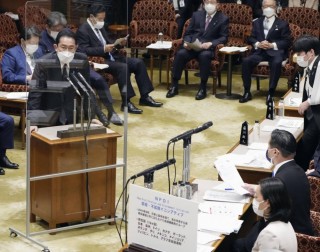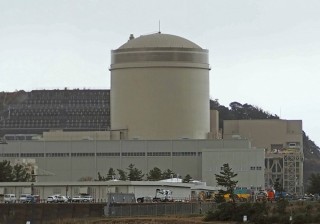Loading
Search
▼ Japan To Discuss Creating New Police Unit To Guard Nuclear Plants
- Category:Other
Prime Minister Fumio Kishida said Monday that the government will consider establishing a new police unit in charge of protecting the nation’s nuclear power plants.
“Now that the public is becoming increasingly concerned about nuclear power plant safety, I would like to discuss the possibility of deploying a dedicated nuclear power plant special security force across the nation,” Kishida said during an Upper House Budget Committee meeting.
The prime minister’s remark comes in the wake of Russia’s attack in early March on Ukraine’s Zaporizhzhia nuclear power plant, in which Russian forces fired heavy weapons in the direction of the plant’s reactors.
In addition to occupying the Zaporizhzhia plant, Russian troops also control the Chernyobyl plant, which has been nonoperational since a 1986 accident resulted in a core meltdown. A third Ukrainian plant, Yuzhnoukrainsk, is also at risk, with reports last week indicating that Russian troops were about 30 kilometers away.
Russia’s seizure of Ukrainian nuclear power plants prompted reflection in Japan about the vulnerability of its own nuclear power fleet. On Tuesday, Fukui Gov. Tatsuji Sugimoto called for the deployment of the Self-Defense Forces near the prefecture’s 15 reactors, including both those that are operational and those scheduled for or undergoing decommissioning.
Fukui Prefecture has the largest number of nuclear reactors in the country.
“Reactors should never be attacked, but to prepare for such a contingency, I urge the Defense Ministry to set up SDF bases to halt such attacks,” Sugimoto said when presenting his request to Defense Minister Nobuo Kishi.
Kishida, however, indicated that he wants to discuss strengthening nuclear power plant security through the expansion of the specialized police unit that guards the Fukui plants, not the SDF. In Fukui, the Nuclear Facility Security Unit is exclusively tasked with guarding nuclear power plants.
“Now that the public is becoming increasingly concerned about nuclear power plant safety, I would like to discuss the possibility of deploying a dedicated nuclear power plant special security force across the nation,” Kishida said during an Upper House Budget Committee meeting.
The prime minister’s remark comes in the wake of Russia’s attack in early March on Ukraine’s Zaporizhzhia nuclear power plant, in which Russian forces fired heavy weapons in the direction of the plant’s reactors.
In addition to occupying the Zaporizhzhia plant, Russian troops also control the Chernyobyl plant, which has been nonoperational since a 1986 accident resulted in a core meltdown. A third Ukrainian plant, Yuzhnoukrainsk, is also at risk, with reports last week indicating that Russian troops were about 30 kilometers away.
Russia’s seizure of Ukrainian nuclear power plants prompted reflection in Japan about the vulnerability of its own nuclear power fleet. On Tuesday, Fukui Gov. Tatsuji Sugimoto called for the deployment of the Self-Defense Forces near the prefecture’s 15 reactors, including both those that are operational and those scheduled for or undergoing decommissioning.
Fukui Prefecture has the largest number of nuclear reactors in the country.
“Reactors should never be attacked, but to prepare for such a contingency, I urge the Defense Ministry to set up SDF bases to halt such attacks,” Sugimoto said when presenting his request to Defense Minister Nobuo Kishi.
Kishida, however, indicated that he wants to discuss strengthening nuclear power plant security through the expansion of the specialized police unit that guards the Fukui plants, not the SDF. In Fukui, the Nuclear Facility Security Unit is exclusively tasked with guarding nuclear power plants.
At Monday’s Upper House budget meeting, Kenichi Sakurazawa, director general of the National Police Agency’s Security Bureau, said it was his intention to strengthen security at nuclear power plants throughout Japan following the Russian attack on Zaporizhzhia.
Sakurazawa said that the current security system in Fukui consists of an armed security force on alert 24 hours a day, 365 days a year.
He explained that special security units equipped with automatic rifles and specialized vehicles are also stationed at nuclear power plants outside Fukui.
Opposition parties, however, are calling for a fixed unit to be established, as the current system means riot police members are transferred out on a rotating basis for a fixed term.
The vulnerability of nuclear reactors to attack has long been a concern in the prefectures that host them. In December, a nationwide association of local towns and villages hosting nuclear power plants issued a call for a legal structure establishing no-fly zones over nuclear power plants and for setting a minimum altitude for flying in their vicinity.
The association also sought stronger cooperation between the SDF, police, the Japan Coast Guard and related authorities to strengthen the defense of nuclear plants from missile attacks and terrorists.
That request came after the National Governors’ Association met in June and issued a similar call for no-fly zones above the plants and a minimum altitude for aircraft in a plant’s vicinity.
On March 4, Chief Cabinet Secretary Hirokazu Matsuno said that if a nuclear power plant in Japan is attacked by a missile from another country, it will be intercepted by missiles.
"We will respond with a multilayered defense that combines an intercept at the upper level by the Maritime Self-Defense Force's SM3-equipped Aegis ships and an intercept at the lower level by the Air Self-Defense Force's PAC-3 missiles," he said, referring to surface-to-air missile systems.
Shigeru Handa, a defense writer and adjunct professor at Dokkyo University and Hosei University, said Matsuno’s answer was limited to what is possible in terms of defense when Aegis destroyers and PAC-3 missiles are pre-deployed in case of an attack on a nuclear power plant.
“Constitutionally, there is no problem with the SDF guarding nuclear power plants. However, the Self-Defense Forces Law limits the scope of SDF protection to U.S. military facilities and SDF facilities. Revision of the Self-Defense Forces Law is necessary to protect nuclear power plants,” he said.
As of Feb. 28, Japan had 60 nuclear power plants, spread across 13 of the nation's 47 prefectures. Of those, 24 were being decommissioned, 10 were officially in operation and seven had been approved for restart.
Another 10 were undergoing safety inspections, and the nine remaining reactors had not applied for a restart.
Sakurazawa said that the current security system in Fukui consists of an armed security force on alert 24 hours a day, 365 days a year.
He explained that special security units equipped with automatic rifles and specialized vehicles are also stationed at nuclear power plants outside Fukui.
Opposition parties, however, are calling for a fixed unit to be established, as the current system means riot police members are transferred out on a rotating basis for a fixed term.
The vulnerability of nuclear reactors to attack has long been a concern in the prefectures that host them. In December, a nationwide association of local towns and villages hosting nuclear power plants issued a call for a legal structure establishing no-fly zones over nuclear power plants and for setting a minimum altitude for flying in their vicinity.
The association also sought stronger cooperation between the SDF, police, the Japan Coast Guard and related authorities to strengthen the defense of nuclear plants from missile attacks and terrorists.
That request came after the National Governors’ Association met in June and issued a similar call for no-fly zones above the plants and a minimum altitude for aircraft in a plant’s vicinity.
On March 4, Chief Cabinet Secretary Hirokazu Matsuno said that if a nuclear power plant in Japan is attacked by a missile from another country, it will be intercepted by missiles.
"We will respond with a multilayered defense that combines an intercept at the upper level by the Maritime Self-Defense Force's SM3-equipped Aegis ships and an intercept at the lower level by the Air Self-Defense Force's PAC-3 missiles," he said, referring to surface-to-air missile systems.
Shigeru Handa, a defense writer and adjunct professor at Dokkyo University and Hosei University, said Matsuno’s answer was limited to what is possible in terms of defense when Aegis destroyers and PAC-3 missiles are pre-deployed in case of an attack on a nuclear power plant.
“Constitutionally, there is no problem with the SDF guarding nuclear power plants. However, the Self-Defense Forces Law limits the scope of SDF protection to U.S. military facilities and SDF facilities. Revision of the Self-Defense Forces Law is necessary to protect nuclear power plants,” he said.
As of Feb. 28, Japan had 60 nuclear power plants, spread across 13 of the nation's 47 prefectures. Of those, 24 were being decommissioned, 10 were officially in operation and seven had been approved for restart.
Another 10 were undergoing safety inspections, and the nine remaining reactors had not applied for a restart.
- March 14, 2022
- Comment (0)
- Trackback(0)



